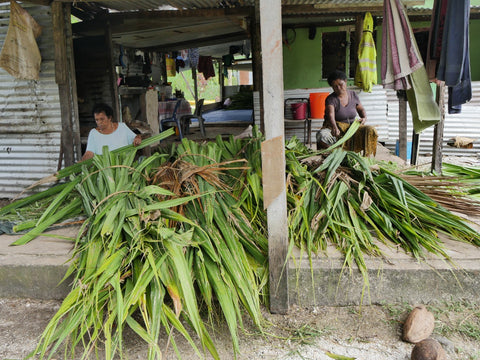Mats With a Conscience: Tali Tali Hand-Woven Fijian Yoga Mats
Yoga and sustainability go hand in hand, as evidenced by the increasing number of yogis opting for eco-friendly, ethical yoga mats and gear. So you can imagine our delight when we stumbled across hand-woven, sustainable yoga mats created by a woman's cooperative based in Taveuni Island, Fiji.
Project founder Ilil Lunkry started Tali Tali (which means woven in Fijian) to empower indigenous women, honour the art of traditional weaving, and create environmental awareness.
Weaving in Fiji is a tradition passed down from generation to generation through the lineage of women, and woven mats still hold immense cultural value. From daily life to special occasions, woven mats are a big part of Fijian culture and usually the only furniture seen in a Fijian home.

The Tali Tali team - who are all local women from Taveuni - create stunning woven yoga mats from the Pandanas plant, which is native and wild in Fiji. Their unique skill set allows them to create financial freedom and support their families. Each mat takes around five to six hours to create, and the mats are purchased directly from the weavers for a fair and ethical wage.

Alongside generous remuneration, Tali Tali strives to empower its team beyond the financial. All profits go towards a very special cause: The Woven Village Program, an educational plan providing healing wisdom and guidance in the form of meditation, yoga, dance, and nutrition guidance for local women on the island.
The creation/weaving process
- The Pandanus leaves are cut from the wild or small plantations cultivated by local women. A Tali Tali yoga mat requires 80 leaves.
- The women carry the piles of leaves home where they cut out the spiky spines and edges. The leaves are boiled for a few minutes in a big giant pot over a wood fire, then spread out in the sun for drying.

- The drying process can take between one and three weeks, depending on the sun. After they dry, the pandanas leaves are still hard and stiff, and every strip has to be softened by rubbing them back and forwards around a chair leg or beaten up with a wooden stick. Both ways of softening require great physical power and patience.

- For the patterns on the mats, some leaves are soaked and boiled in a natural black dye.
- Now the weaving can begin. The women will often weave at night time when the children are sleeping, and the pandanas are softer due to the cooler air.

The mats
With a variety of patterns available, each mat comes in at a lightweight 700grams and is 2-3mm thick, 65cm wide, and 170cm long.
The natural fibres of the mats are breathable, offer good grip, and are perfect for restorative and Yin styles of yoga practice. While a Tali Tali mat probably won't replace your main yoga mat, they're a lovely option for the aforementioned styles, and they're ideal for a blissful grounding experience during meditation.








